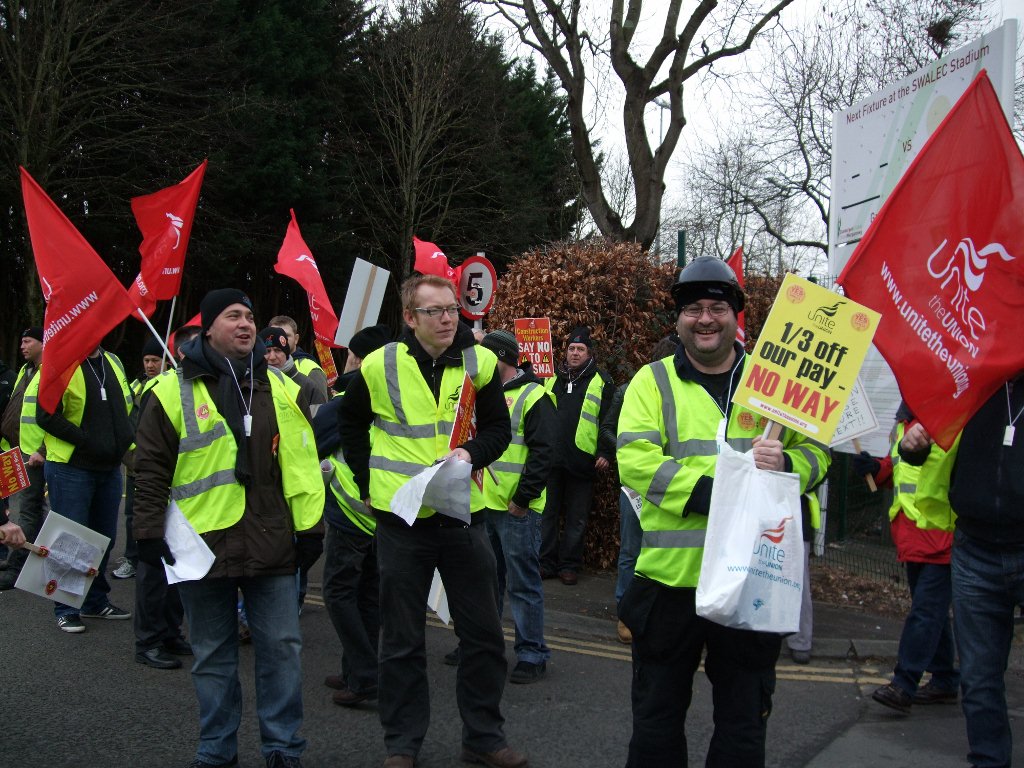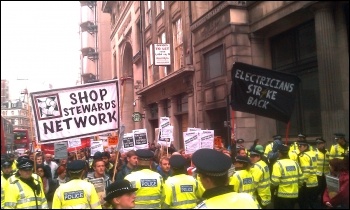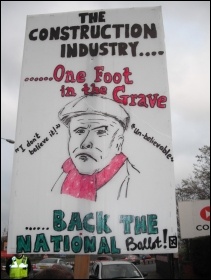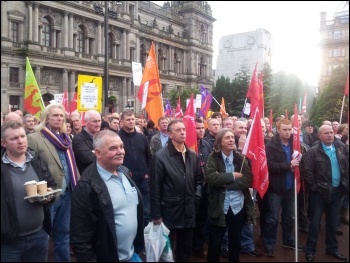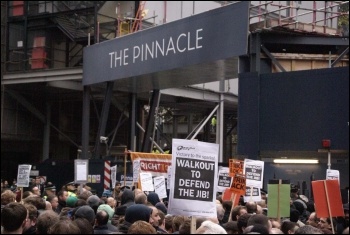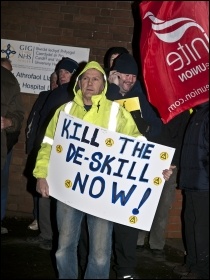‘Priceless victory’ of sparks against the Dirty Seven
The following article by Rob Williams is an updated version of an article being carried in the March issue of Socialism Today.
The tremendous victory of the construction electricians against the multinational Balfour Beatty and six other building contractors, confirmed yesterday, is a hugely significant moment for these workers but also the rest of the union movement, particularly in the private sector.
Unite should now organise a massive union organising campaign on the construction sites nationally, lead by the new layer of electricians that have been at the heart of this dispute.
2011 ushered in a new period of struggle for workers in Britain: The huge March 26th TUC demonstration in London, the June 30th strike of civil servants, teachers and lecturers, and the massive two million strong strike of public sector workers on 30th November (N30).
While the outcome of the pension struggle as with the battle against the cuts has still to be determined, the sight and sounds of millions of workers out on strike and hundreds and thousands on rallies and demonstrations with union placards and banners has undoubtedly raised the profile of trade unions and once again legitimised the idea of workers’ struggling to defend their jobs, terms and conditions and pensions from the employers’ assault.
It must be more than coincidental that from the end of 2011 through to the opening months of 2012, we’ve seen a rash of private sector disputes from Unilever to the Wincanton oil tanker drivers and the Stagecoach bus drivers.
This isn’t to say that these battles have appeared out of thin air. As with many workplaces, particularly in the private sector, the numerous grievances can burst out into an open dispute depending on the confidence of the workforce. But this has been given a boost by the public sector strikes.
Of these struggles, perhaps the most resilient, tenacious and at times openly combative has been that of the construction electricians over the last six months, who come under the Joint Industry Board (JIB) national agreement.
Initially, eight of the biggest contractors (NG Bailey, Balfour Beatty, Tommy Clarke, Crown House Technologies, Gratte Brothers, MJN Colston, SES and SPIE Matthew Hall) signalled their intention to withdraw from this agreement and impose a new set of terms and conditions called the Building Engineering Services National Agreement (BESNA).
However, at an early stage, one of the companies, MJN Coulston, pulled back under the pressure of the workers’ campaign.
The remaining Big (or ‘Dirty’) Seven wanted to use BESNA to attack electricians and other skilled workers by breaking up their trade by having different rates of pay depending on the exact skills set used on a particular job.
This de-skilling would have seen some workers having their pay reduced by up to 35% if they had been given a job with the minimum skill level.
In fact it would have opened the door to employers reducing the number of fully trained ‘expensive’ workers and instead backfilling with lower-paid semi-skilled workers.
Quite apart from the monetary aspect, it raised health and safety concerns, particularly as these workers are employed on a whole range of sites, including oil refineries, renovating London Underground stations, and at nuclear power stations! Saying that, this is the government that has stripped bare the budget of the Health and Safety Executive through cuts of up to 35%.
This is the familiar ‘race to the bottom’ that the employers in all sectors have been engaged in over the last decade or so.
The prize for the bosses is to increase their profits as successive governments have been forced to update Britain’s under-invested infrastructure.
Balfour Beatty alone has an order book of £15 billion and made almost £100 million profit for the first six months of 2011! (The Telegraph, 24.2.12).
The incredible and successful Lindsey Oil Refinery struggle in 2009 was against the construction employers trying to break the National Agreement for the Engineering Construction Industry (NAECI), which covers sites such as power stations and oil refineries and processing plants.
The employers have continued this offensive since then with lockouts at Fawley in Hampshire and Saltend in Humberside in 2011.
Socialist Party member Keith Gibson played a key role in both the Lindsey and Saltend disputes. In the latter, while the workers were eventually unable to get their jobs back, they were able to win an enhanced redundancy package.
It has been noticeable that the employers and their friends in the right-wing media have also learned lessons from 2009 and looked to stop any significant publicity.
In effect there has been a media blackout of the 2011/12 dispute. Many electricians supported our proposal for Unite to take out a full page advert in the national press to publicise their fight and break this blockade.
In a similar way to the Lindsey struggle, the electricians’ battle to defend the JIB has been led by rank and file activists.
Many of those in leading positions are experienced activists, some of whom have been blacklisted after being involved in important disputes such as that on the Jubilee London Underground line, Royal Opera House, Pfizer and power generation projects across the UK when the employers last attempted to undermine electricians’ terms and conditions in 1999.
A rank and file meeting called last August in London of around 500 workers proved to be the catalyst for nationwide protests, site and office occupations and at their peak have turned into unofficial strikes.
Construction workers’ strike on 14 December: Corus Redcar electricians, photo Elaine Brunskill (Click to enlarge: opens in new window)
Inevitably, in such a protracted struggle there have been ups and downs, with different regions going ahead or even springing into action while other areas have quieter periods.
There has been a weekly London protest at 6.30am for six months! This has been repeated in Manchester, Liverpool, Hartlepool, Cardiff, Scotland, Ratcliffe and many other areas.
There have been major milestones. The first protest at the Balfour Beatty London Blackfriars site on 24th August called by the rank and file meeting attracted hundreds of electricians and started the momentum.
Unite called a national protest in London on 14th November, which saw over 2,000 electricians march on Blackfriars.
But earlier in the morning, the rank and file committee called a protest outside the site of the new Pinnacle skyscraper, where hundreds of workers pushed the police off the road and then held an impromptu march through the City of London! However, later in the day the police kettled 200 of the sparks when they tried to join up with a student protest to show solidarity.
Seeing the need to link up with other workers was also shown on 30th November when the electricians marched to a number of public sector picket lines to show support.
The campaign of the rank and file has pushed Unite into playing a far more leading role. A strike ballot was organised in Balfours and was won with an 82% majority.
Unfortunately, Unite agreed to re-ballot after the company threatened an injunction. It would have been better to force Balfours to at least go to court so that even if it was successful with its action, it would have clearly shown workers that there was no alternative but to take unofficial action.
Correctly, this has been the union’s approach when Balfours challenged the re-ballot which incredibly still saw a 67% vote for strike action in early February.
This time, Balfours’ legal injunction was defeated in court and they capitulated the next day.
The Socialist Party had raised the possibility that even the Tory courts can occasionally rule against the employers, particularly where there is a militant campaign that will continue even if legally blocked.
As with the RMT on the Docklands Light Railway last year, continually ruling out strike ballots on minor technicalities can expose the class nature of the legal process and legitimise unofficial strikes.
This victory in the courts proved to be a decisive turning point in the dispute. An official strike would have raised the dispute to a new level.
The Balfours sparks standing on an official Unite picket line in Grangemouth alone, appealing to the direct workforce could have shut down this oil refinery potentially costing £millions.
A national appeal for solidarity action, even unofficially could have stopped the whole of the construction industry.
This prospect terrified Balfours and their clients. The whole experience of the action taken over the last six months would have left Balfours and the other employers in no doubt that this was possible.
Correctly the electricians have refused to be contained by the anti-union laws. They called for unofficial action on the original planned strike date of 7th December, when no Balfours’ sparks worked in Blackfriars and others walked out on other sites.
Police dogs were used at Blackfriars to break up the protest. A week later over 5,000 construction workers took unofficial strike action when the electricians were joined by workers fighting a pay freeze under the ‘Blue Book’ agreement on NAECI sites.
This showed the huge potential power of these workers when they take action together. If necessary, they could have linked up with the directly employed workers at the oil refineries and power stations and those who service them such as the Wincanton oil tanker drivers.
The involvement of Unite’s Organising Department was also a major turning point. They produced a ‘leverage’ dossier which showed Balfours that it would face a war of attrition that would include its clients being targeted as well.
However, the campaign of the rank and file breathed life into this document. To emphasise this, the 200-strong protest outside the electrical contractors’ ECA awards dinner the day before the result of the legal action, showed the employers once and for all that the strategy of the union would be backed up by the troops on the ground.
The emergence of the rank and file, with regular meetings between the leading electrician activists and the union officers and national meetings of the sparks acted as a check on the officials and a lever on the official structure of Unite.
It has shown that the union officialdom isn’t a homogeneous block of conservatism that can’t be moved into a positive role.
The cynicism and pessimism of many union officers, a result of the last few decades of defeats has been pushed aside by the energy and determination of the sparks.
This pressure will be needed to ensure that any talks with the employers improves the JIB rather than agreeing a ‘BESNA 2’.
As with the running of the dispute, any such negotiations need to be transparent and democratically controlled by the rank and file.
The campaign of the rank and file electricians has forced Unite belatedly to take the dispute seriously but in return, the union’s involvement has revealed a positive role of the official union structure, particularly when married to a militant and active membership.
Coming on the back of the successful reinstatement of Paddy Brennan, the Unite convenor in the Swindon Honda car plant last year, and the forcing of Unilever and Wincanton back to the negotiating table in recent weeks, it shows that the potential power of Unite in particular, and private sector workers in general, can be realised.
Construction workers protesting in Cardiff, 7.12.11, photo Mariam Kamish (Click to enlarge: opens in new window)
It should inspire the union to ask its members in the NHS and local government to join with PCS, NUT and others in the next pension strike on 28th March.
While it’s true that workers learn from setbacks, victories are priceless. This one will give confidence to a new layer of activists across all the trades in the industry to see the need to become active in Unite on the sites to defend workers from the rapacious bosses in this dispute and the many battles to come and in particular to rid the industry of scourges such as agency working and the blacklist.
The Socialist Party sends its congratulations to Unite and the rank and file electricians, as has the National Shop Stewards Network.
We have been proud to support and assist with their campaign. This struggle has exposed the short-termism of the big construction companies and the inability of capitalism to properly plan the development of the infrastructure needed for a modern economy.
We argue that only nationalising these companies along with the other major industrial and financial levers, would allow a real socialist plan of production and construction.
This would open the way to a rational and safe infrastructure and construction industry with decent pay and conditions for the workforce and proper training and apprenticeships for young people.
In the meantime, the pressure to maximise their profits will force the employers to look again at attacking construction workers’ jobs, pay and conditions. Next time, however, they will face a workforce buoyed by success.
This version of this article was first posted on the Socialist Party website on 24 February 2012 and may vary slightly from the version subsequently printed in The Socialist, which had the title: “Construction electricians score a victory”.
National Shop Stewards Network 6th annual national conference
Speakers include:
- RMT general secretary, Bob Crow
- PCS general secretary Mark Serwotka
- A leading Rank and File Unite construction electrician
- Kevin Courtney, NUT deputy general secretary


